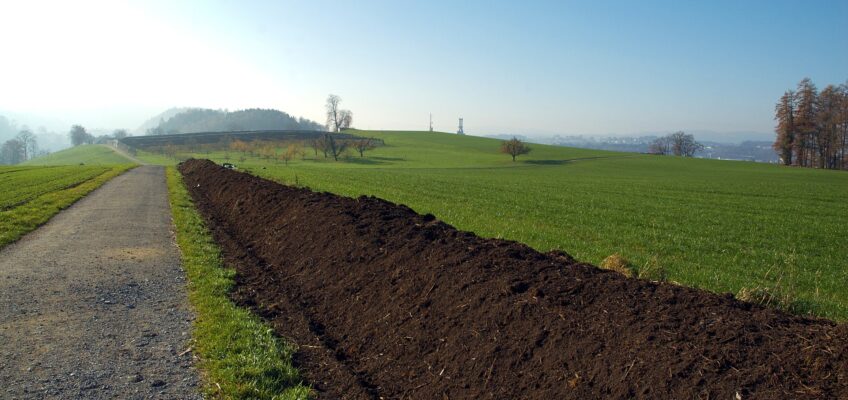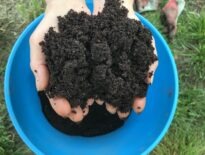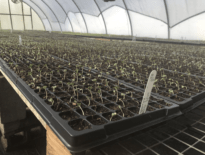Currently, no federal policy exists that encourages or provides resources to mobilize a national composting effort, though several states do have policies that support and recognize the benefits of composting. Furthermore, The U.S. Department of Agriculture (USDA) does not yet recognize composting as an approved conservation practice, thus rendering composting ineligible for USDA conservation program funding and support. Federal policy that accelerates national composting efforts will play a critical part in meeting the U.S.’ net-zero emissions goals by 2050.
On July 16, 2021, Congresswoman Julia Brownley (D-CA26) introduced the Cultivating Organic Matter through the Promotion of Sustainable Techniques (COMPOST) Act in the U.S. House of Representatives. This new federal bill aims to proactively advance composting infrastructure and support across the country.
The bill’s co-sponsors include Representatives Chellie Pingree (D-ME01), Ann Kuster (D-NH), and Scott H. Peters (D-CA52).
The US Composting Infrastructure Coalition (USCIC), of which the Institute for Local Self-Reliance is a founding member, played a pivotal role in the development of the bill.
“A massive investment in composting infrastructure is needed for rural and urban America. Composting can restore depleted soils, protect the climate and create thousands of new jobs. We won’t see these benefits if we don’t help farmers, entrepreneurs, and local governments build needed systems and programs.”
– Brenda Platt, Director of ILSR’s Composting for Community Project, and member of the USCIC
Read ILSR’s full press statement on the COMPOST Act.
Read USCIC’s press release on the COMPOST Act.
Support the COMPOST Act by communicating directly with your elected officials.
The COMPOST Act
The main purpose of the COMPOST Act is:
“To require the designation of composting as a conservation practice and activity, and to provide grants and loan guarantees for composting facilities and programs, and for other purposes.”
This bill would amend section 1241(j) of the Food Security Act of 1985 to officially define and designate composting as a conservation practice and activity. It would further add specific language on composting throughout the Food Security Act’s text.
“Sec. 2. Composting as a Conservation Practice.
(2) Composting as a conservation practice and activity.-
1. In general, the Secretary shall by regulation provide that composting is a conservation practice and a conservation activity for the purposes of this title.
2. Composting defined.-
(i) In general.- For the purposes of this paragraph, the term ‘composting’ means-
(I) an activity (including an activity that does not require the use of a composting facility) to produce compost from organic waste that is-
(aa) generated on a farm; or
(bb) brought to a farm by a nearby community and used to produce compost on that farm
(II) the use and active management of compost on a farm, in accordance with any applicable Federal, State, or local law, to improve water retention and soil health.”
It would also add a section (310J) to the Consolidated Farm and Rural Development Act on establishing a grants and loan guarantees program for projects that expand access to food waste composting. This section allocates $200 million per year over the course of a decade in grants and loan guarantees for composting facilities.
“Sec. 310J. Grants and Loan Guarantees for Composting Programs.
1. In general.- The Secretary, in consultation with the Administrator of the Environmental Protection Agency, shall establish and carry out a program to award grants and loan guarantees, on a competitive basis, for projects that expand access to food waste composting.”
Funding for Projects of All Sizes
ILSR pushed for the COMPOST Act to ensure flow of funding to compost sites and programs of all sizes, and not just large-scale, centralized facilities. As a result, the COMPOST Act includes the following stipulations on eligible projects, key requirements, and priority factors:
- A wide range of projects will qualify for funding including compost application on farms and onsite composting systems and programs (such as home and community composting programs) as well as projects based on a distributed infrastructure strategy that incorporate a mix or choice of strategies.
“Sec. 310J. Grants and Loan Guarantees for Composting Programs.
(d) Eligible Projects.- The Secretary may award grants and loan guarantees under this section for projects to carry out the following:
(4) Implementation of onsite composting systems and programs (such as home composting programs, community garden and urban farm composting, and other onsite composting systems at institutions, nonprofits, and businesses).
(5) Projects that are based on a distributed infrastructure strategy (such as a strategy that incorporates a mix or choice of home composting, farm and ranch composting, onsite composting, community-scale composting, or centralized commercial composting).
(6) Collection of organic waste intended for processing at a composting facility or system, or through a composting program, including curbside pick-up programs, community drop-off programs, and facility- or event-specific programs (such as programs at schools, restaurants, stadiums or festivals).
(7) Activities for land-based compost application, including compost application on a farm or ranch.”
- At least $50 million will be allocated to non-centralized, non-commercial projects each year (those producing <10,000 tons per year of compost).
“Sec. 310J. Grants and Loan Guarantees for Composting Programs.
(b) Grants.-
(2) Allocation.- Of funds made available to carry out this subsection in each fiscal year, the Secretary shall allocate not less than $50,000,000 to projects that do not include the use of centralized commercial composting, to the extent there are sufficient applications for such projects.”
(h) Definitions.- In this section:
(2) Centralized Commercial Composting.- The term ‘centralized commercial composting’ means a regional composting facility that produces at least 10,000 tons of compost annually.”
- A key eligibility criterion for projects is the inclusion of at least one operator trained on composting best management practices.
“Sec. 310J. Grants and Loan Guarantees for Composting Programs.
(e) Requirements.- An eligible entity applying for a grant or loan guarantee under this section shall demonstrate that the project for which such assistance is sought-
(1) will-
(C) include at least one operator of a facility or system, if applicable, who is trained on best management practices for composting (such as odor, vector, pathogen, and contaminant control practices);”
- Priority funding will be allocated to projects that further tenants of expanded social equity and environmental justice, including projects that support underserved communities, engage BIPOC-led farms and businesses, incorporate small and diverse businesses, practice inclusivity, and provide living wages.
“Sec. 310J. Grants and Loan Guarantees for Composting Programs.
(f) Priority factors.- In awarding grants and loan guarantees under this section, the Secretary shall prioritize projects that include the greatest number of the following factors:
(1) The project is located in or is serving a location with significant access to food waste and no or limited prior access to food waste composting.
(2) The project demonstrates the potential to create new capacity for the volume or weight of food waste collected and processed, or make significant gains in the number of people with access to food waste composting facilities or systems.
(3) The project includes a demonstrated plan for following best management practices and producing a high-quality compost product.
(4) The project incorporates the participation of small and diverse businesses (such as minority-, woman-, and veteran-owned businesses certified by the Small Business Administration or under a State program or another recognized certification program and other businesses led by Black people, Indigenous people, or other people of color).
(5) The project creates opportunities for hiring and leadership development practices that are inclusive and provide living wages.
(6) The project is for a facility or system that accepts or plans to accept and process only source separated organics.”
Take Action!
Support the COMPOST Act! Click here to communicate directly with your elected officials and voice your support for this critical legislation.
The text of the bill can be found here.
The Zero Food Waste Act – Companion Bill
In addition to the COMPOST Act, Congresswoman Julia Brownley also introduced the Zero Food Waste Act to the U.S. House of Representatives on July 16, 2021. This bill would provide grants of $650 million per year 2022 through 2030 to municipal, state, and tribal governments through the Environmental Protection Agency (EPA) to fund food waste and loss measurement, planning and prevention efforts, and necessary food rescue and food scrap recycling infrastructure. The goal of this law is to reduce food waste by 50% by 2030 (relative to 2010 levels).
“Sec. 2. Food Waste Reduction Grants.
(a) In general.-
(3) Grants.-
(C) Food waste reduction projects.-
(i) In general.- Under the program established under paragraph (1), the Administrator may award a grant to an eligible entity to, with respect to the State or area in which the eligible entity is located or otherwise serves-
(I) carry out or otherwise support food waste reduction activity;
(II) implement differential pricing policy to-
(aa) disincentivize disposing of food waste by incineration or deposit in a landfill; and
(bb) incentivize carrying out food waste reduction activities;
(III) pay for or provide technical assistance to carry out a food waste reduction activity;
(IV) implement a ban on disposing of food waste by incineration or deposit in a landfill;
(V) implement food waste reduction activity requirements;
(VI) implement a landfill tax in addition to existing tipping fees that municipal waste facilities charge per pound of waste;
(VII) implement demand-stimulating policies for recycling end-markets; and
(VIII) carry out any other activity the Administrator determines will reduce the amount of food waste in the applicable area.”
The full text of the bill can be found here.
The Climate Stewardship Act of 2021 – Complimentary Bill
On April 12th, 2021, Senator Cory Booker (D-N.J.) introduced the Climate Stewardship Act of 2021 (S. 1072), which supports soil health and composting. This Act includes a Soil Health Equipment Grant Program (Section 110). If passed, this grant program would provide $100 million per year until 2030. Grant priority will be given to farmers acquiring equipment for (1) non-chemical termination of cover crops, and (2) on-farm composting facilities.
“Sec. 110. Soil Health Equipment Grant Program.
(c) Priority.- In providing grants under subsection (b), the Secretary shall give priority to equipment for-
(1) projects to carry out nonchemical termination of cover crops; and
(2) on-farm composting facilities.
(d) Funding.-
(1) In general.- There is authorized to be appropriated to carry out this section $100,000,000 for each of fiscal years 2021 through 2030
(2) Set-asides for socially disadvantaged and beginning farmers and ranchers.- Of the amount made available under paragraph (1), the Secretary shall set aside-
(A) 5 percent to provide assistance to socially disadvantaged farmers and ranchers (as defined in section 2501(a) of the Food, Agriculture, Conservation, and Trade Act of 1990 (7 U.S.C. 2279(a))); and
(B) 5 percent to provide assistance to beginning farmers and ranchers (as defined in that section (7 U.S.C. 2279(a))).”
Featured image: The proposed grant and loan guarantees program under the COMPOST Act will support farms across the US in developing on-site composting and compost application infrastructure. Credit: Creisi – Pixabay





